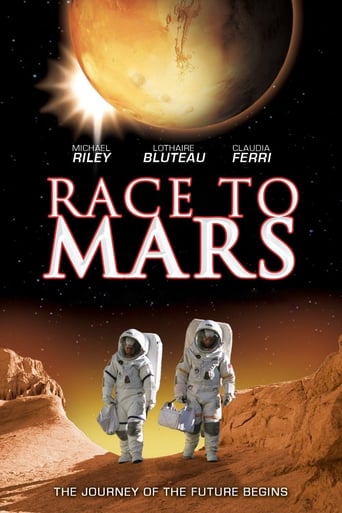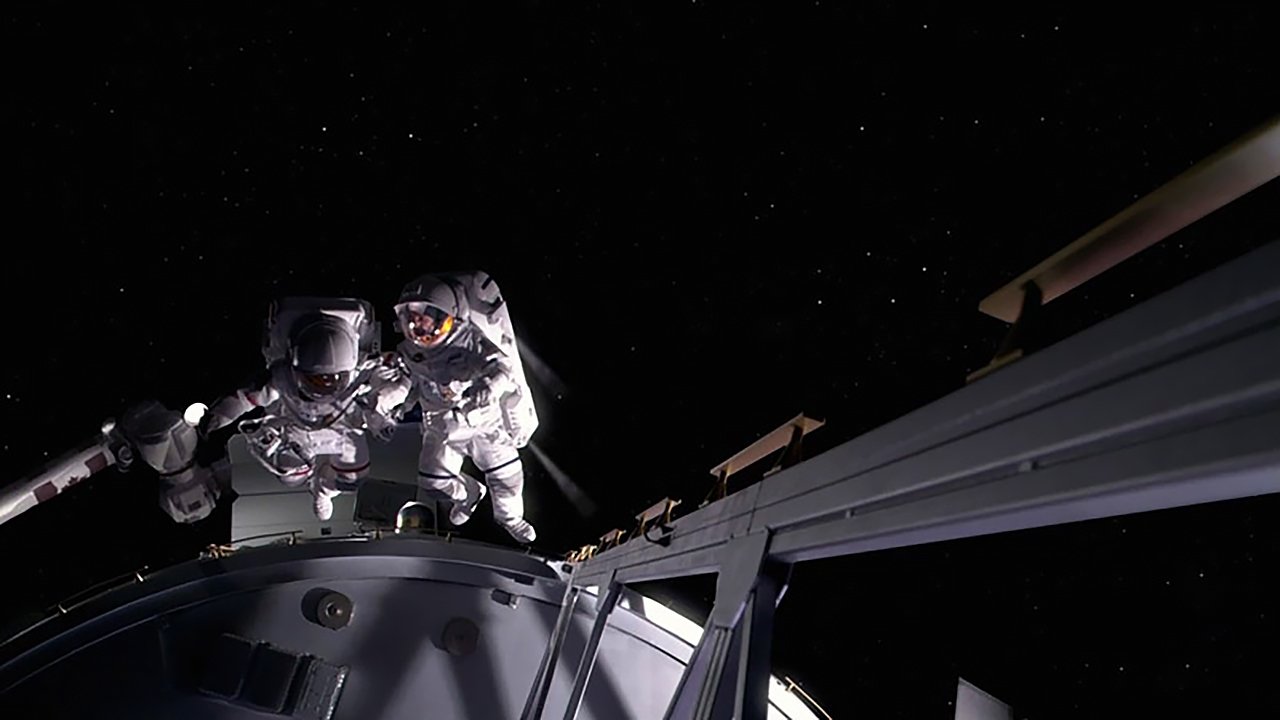gwlucca
This was an unexpectedly realistic treatment of the first manned voyage to Mars. It is far from scientifically accurate in every respect, but it scores more points for realism than films with 10 times its budget.The story is a bit slow, but then again, that would be reflective of the pacing on a real voyage to Mars lasting years. The computer graphics were at times so convincing that it is easy to buy into them, especially the EVA scenes.I found the acting more than adequate; they were convincing enough for me to care about their characters. That's more than I can say about many films.The title is a bit of a deception. This is not a "race" to Mars rather than a slow sailing boat voyage with plenty of time for reflection. Eight stars out of ten.
blackhawk66
I am surprised by the unfavorable comments for "Race to Mars." I found it plausible and enjoyable. I appreciated the attempt to present a realistic story of what the first human trip to Mars might be like. Yes, there were a few minor gaffs; objects floating around the spacecraft while it was under acceleration being one of the most obvious. But the vast majority of the sets, costumes, spacecraft design and performance, cgi created environments, action and behavior seemed, to me, to be very believable. The show convinced me that it could happen that way. The actors were unknown to me but I thought they did an outstanding job. Not having recognizable faces in the show was an asset in that it contributed to the realism. The problems and obstacles the characters had to overcome were mostly convincing and interesting (I expect it is true that the doctor should have detected the CO poisoning in blood tests but must admit that did not occur to me while I was watching the show).Overall, I was very impressed and satisfied with "Race to Mars." I consider it one of the better things I've seen in this field in some time. It is certainly superior to most of the sci-fi/space opera that passes as science fiction.
mdrejhon
Overall, an amazingly realistic "space drama" 4-hour TV show for the right expectations - a show that makes you think. A show for the "Deep Impact" crowd rather than the "Armageddon" crowd.As a science fiction enthusiast and a space technology reader, I can recognize that some people expected a nonstop action-filled movie and got disappointed by it. The show is more of interest for the documentary/intellectual crowd, or the docudrama crowd, than for the popcorn movie crowd.In short, this series is designed as a more realistic (if slightly hollywoodified) portrayal of a manned mars mission. This series is much more realistic than "Mission to Mars" and "The Red Planet", if you are looking for realism (including boredom) instead of popcorn action (nonstop action).Without going into the plot, there are a number of realistic portrayals exhibited in this show, included included psychology elements of a manned mars trip, scandal (remember Nowak), skipped quality-control checks (just see all the product recalls going on these days), politics, a 'reasonable' going-against-mission-control school of thought (just remember Alan Shepard played a little unauthorized golf on the moon in 1971), spacecraft software bugs and radioed upgrades (very common in current spacecraft), the amount of time it took to travel to Mars is similar to current mars missions, the use of centrifugal force for artificial gravity, a number of very reasonable disasters (some of which are similar to what has happened before - fire on MIR space station, collision of Spektr of MIR, space shuttle disaster, - all real space disasters etc), Apollo 13 style improvisation (did you know they actually used duct tape and plastic bags to fix the life support system?), boredom, health issues, bathroom, mold, laboratory animals, experiments, and lots more. Even the use of nuclear thermal propulsion system was a somewhat realistic idea - lots of designs were tested in the 1960's (wikipedia: "Nuclear thermal rocket") and almost became mission-ready until concerns about radioactivity came to fore. Nuclear thermal is theoretically simple - use heat of a hot nuclear object to turn a liquid into superheated gas which comes out of the rocket -- rather than more fun but currently-unobtainable technology such as fusion or antimatter rockets. Given production budget limits, understandable uses of pre-existing technologies have had to be used (i.e. thick tablet computers, etc) which adds slightly to a cheesy effect for the technologically knowledgeable people, but it is very likely we will still use very similar technologies then.The China reference is realistic. Let's not forget we all 'hated' or 'feared' the soviets (USSR) one way or another back in its day. Whether we like it or not, apparently China is slowly catching up - being the 3rd nation to have a man in space already, and are planning to send a rover to the moon in the near future (see BBC news, etc), so the reference to China was relatively realistic. China is getting more scrutiny these days, so there's a lot of negativity, but let's be fair -- they have clearly demonstrated actions with ambitions to be a contender for a future space race -- and let's face it, while imperfect, life is apparently much better there than it was in 1989 -- it's night and day. Given time, China would very realistically fit into this movie's time line.Granted, there are many unrealistic portrayals too. There is some amount of Hollywood-ification. The time line for a Mars mission of this scale as early as 2030 is a little unrealistic, considering NASA has said 2037 as the earliest date for a Mars mission, according to Griffin, the admin of NASA. Especially considering the size of the ship, is kind of huge for a first Mars mission which would probably be more Wright Brothers-like in scale (something bigger than Apollo, but much smaller than the ship in this movie). In addition, there's the usual audio outside the ship - understandable use, even if it should be dead quiet. There are a lot of other unrealistic elements, but all made-for-TV, even "based on a true story" shows, have dramatizations to varying extents."Race to Mars" excels as excellent inspiration to travel to Mars. I hope that a few people are encouraged to work towards space program as a result of this show This is the type of movie that makes you think more; and the movie likely more greatly appeals to the intellectuals, who enjoyed movies such as 'Deep Impact' more than 'Armageddon'. (More background information: The popcorn excitement in 'Armageddon' was more fun and exciting, while the more realistic elements were in the movie 'Deep Impact'. Many of these types of 'earth-is-doomed' movies still suffer from unrealistic premises (i.e. small number of nuclear bombs being blown up on such asteroid/comet objects so close to planet Earth, are not realistic), but intellectual purists have recognized that realistically a real-life asteroid/comet impact event would more realistically resemble 'Deep Impact' than 'Armageddon', despite lots of other impossibilities apparent in both movies.) Both movies were enjoyable - but for very different reasons.We would be happy to see many more of these high quality made-for-TV shows as time passes. I am impressed that only $12 million was spent (production, excluding marketing) to make a show of this high quality, of 4 hours in length, and in full high-def. This budget was huge by Canadian TV standards, but tiny for a Hollywood film. While probably not Acadamy Award material (except for 'best documentary', if it was a real event), this show was easily much superior quality to many more expensive productions that made it to the big screen. 9 out of 10 stars.
David Jones
It's not that these actors can't act; I've seen several of them do great work in other roles. But here, they just seem to plod through most of their scenes, having to chew their way through dialogue that veers from corny to painfully expository. The writers and the director have to share about equal parts blame for this one.Crises emerge that ought to be engaging and suspenseful, but they're so badly structured and dramatized that every moment just falls flat. Which brings me to the look of this production: The computer-generated backgrounds are just mediocre, hardly better than NASA-sponsored animations they commissioned to illustrate their missions almost five years ago. The spaceship interior sets are reasonably convincing, but the backgrounds for the transmissions from mission control look really cheesy.There were also a couple of factual peculiarities: I'm not sure if I missed something, but five days into the mission, a relative complains about the inconvenience of having to send video e-mails, as opposed to being able to have a two-way conversation. Five days? They wouldn't be that far from Earth in five days. I can't imagine more than an eight- or 10-second delay in transmissions after five days--especially at the speed these guys are travelling. Every scenario for a manned Mars mission that I've read talks about a 6-month flight to Mars. These guys take almost a year, for some reason (a year in which, by the way, no one looks one iota different than when he or she started out). The music sounds as if it was done by a guy with a synthesizer in his basement.What a disappointment.


 AD
AD






